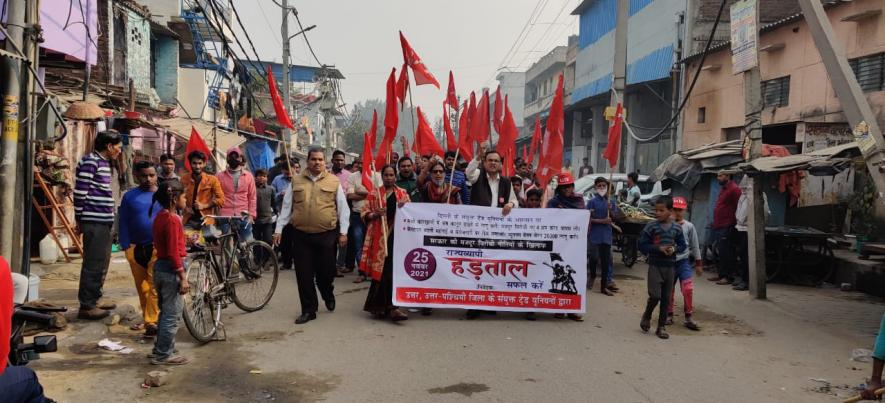Workers' Strike Brings Industrial Areas in Delhi NCR Almost to a Halt

"Inquilab Zindabad" slogans rang through the industrial quarters in Delhi, as workers staged a citywide one-day strike on Thursday to protest against the "brazen neglect" that they have been facing more than ever after the pandemic.
Led by the 12 Central Trade Unions, the striking workers flayed both the Aam Aadmi Party (AAP)-led Delhi government and the Bharatiya Janata Party (BJP) at the Centre for their policy decisions that purportedly shifted the labour regimes in favour of the employers.
As such, industrial areas in North West Delhi wore a somewhat deserted look, with the hustle-bustle of the manufacturing units that deal with utensils, dyes, chemicals, plastics, electrical and auto spare parts, among others, brought to a halt for the day.
Instead, workers' took out rallies; public meetings were organised at other places in the national capital that collectively brought to the fore the major issues faced by the city's working population.
"It is becoming difficult to survive in the city," lamented Halima Khatun, with a weary look on her face. On Thursday, the 28-year-old partook in a strike rally organised in Jahangirpuri Industrial Area to protest against her maalik (employer), who would not agree on paying more than Rs 6,000 a month. "That also, only after working for up to 10 hours every day," Khatun, who works in a packaging unit, told Newsclick, adding there are no other women in her locality in her knowledge who gets more than the said monthly rate.
Similar were the grievances shared by Tun Tun Kumar Jha, in his 30s. Employed in a utensil polishing unit in Badli Industrial Area, Jha informed Newsclick that he earns about 12,000 a month in wages – this includes even the amount he would receive for his overtime labour. "Now, you see," the worker, hailing from Bihar, said, "how anyone with a family can survive on such low wages."
To be sure, minimum wages for the working force in the national capital is among the highest in the country. And, to ensure that workers like Khatun and Jha are not denied these wage rates, the AAP government, earlier in 2018, also enforced stringent penalties that included higher fines and prison terms for the offenders.
Yet, the situation on ground is "far worse than one could imagine," said Santosh Kumar. When asked for the reason behind it, the Centre of Indian Trade Unions (CITU) leader in Badli Industrial Area pointed towards "lack of any proper enforcement mechanism" within the district labour departments to "keep a check" on the employers.
Nadeem Hussain, a United Trade Union Congress (UTUC) leader in Wazirpur Industrial Area, tended to agree. "There are no enough labour inspectors; while, those who are there do not carry out any inspections," he alleged, further suggesting this to be the case because of "corruption".
Meanwhile, Thursday's workers' strike rallies and demonstrations were also joined by the capital's university students and teachers. "The students of today are the workers of tomorrow," said Varkey Parakkal, a Delhi state unit member of the Students Federation of India (SFI).
Hence, all that affects the working population must concern the students, he told Newsclick, while participating in a rally in Jahangirpuri Industrial Area.
Workers also took out processions in Patparganj and Jhilmil, Okhla, North Delhi's Rajdhani Uddog Nagar, Badli, Wazirpur, Sahibabad, Ghaziabad, and Noida Industrial Area.
In Sahibabad, Site 4, workers sat on the road in front of Holy Faith International Private Limited from 8 am, carrying the CITU flag. There was a complete strike observed in Holy Faith. Samar Singh, a worker, told Newsclick that this strike was the last resort for workers to regain their rights.
Workers of SFS Solution in Sahibabad also observed a complete strike and staged a sit-in outside the gate.
While the workers' strike was mainly in industrial areas across Delhi, government employees and street vendors gathered at the Jantar Mantra near the Parliament House and demonstrated as well. Hundreds of domestic workers along with unions of Delhi Jal Board, DBC, Municipal Corporation, and street tracks, participated.
Devendra Dalal, president of Lal Jhanda Union in Delhi Jal Board, while talking to Newsclick said that they have 20,000 permanent and 5,000 contract workers here. Before Arvind Kejriwal came to power, there were only 1,000 contract workers, he said, adding that it was "shameful because they (AAP government) had come to end the contract system and they are now recruiting only on contract.”
Get the latest reports & analysis with people's perspective on Protests, movements & deep analytical videos, discussions of the current affairs in your Telegram app. Subscribe to NewsClick's Telegram channel & get Real-Time updates on stories, as they get published on our website.























